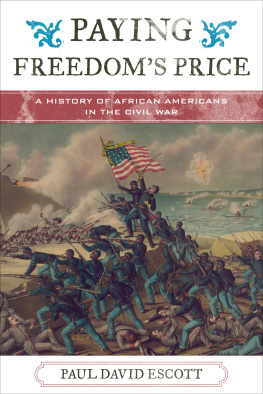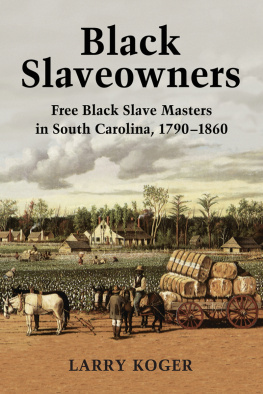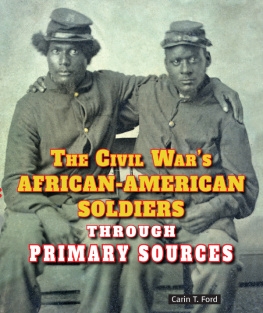Paying Freedoms Price
The African American History Series
Series Editors:
Jacqueline M. Moore, Austin College
Nina Mjagkij, Ball State University
Traditionally, history books tend to fall into two categories: books academics write for each other, and books written for popular audiences. Historians often claim that many of the popular authors do not have the proper training to interpret and evaluate the historical evidence. Yet popular audiences complain that most historical monographs are inaccessible because they are too narrow in scope or lack an engaging style. This series, which will take both chronological and thematic approaches to topics and individuals crucial to an understanding of the African American experience, is an attempt to address that problem. The books in this series, written in lively prose by established scholars, are aimed primarily at nonspecialists. They focus on topics in African American history that have broad significance and place them in their historical context. While presenting sophisticated interpretations based on primary sources and the latest scholarship, the authors tell their stories in a succinct manner, avoiding jargon and obscure language. They include selected documents that allow readers to judge the evidence for themselves and to evaluate the authors conclusions. Bridging the gap between popular and academic history, these books bring the African American story to life.
Volumes Published
Booker T. Washington, W.E.B. Du Bois, and the Struggle for Racial Uplift , Jacqueline M. Moore
Slavery in Colonial America, 16191776 , Betty Wood
African Americans in the Jazz Age: A Decade of Struggle and Promise , Mark Robert Schneider
A. Philip Randolph: A Life in the Vanguard , Andrew E. Kersten
The African American Experience in Vietnam: Brothers in Arms , James Westheider
Bayard Rustin: American Dreamer , Jerald Podair
African Americans Confront Lynching: Strategies of Resistance , Christopher Waldrep
Lift Every Voice: The History of African-American Music , Burton W. Peretti
To Ask for an Equal Chance: African Americans in the Great Depression , Cheryl Lynn Greenberg
The African American Experience During World War II , Neil A. Wynn
Through the Storm, Through the Night: A History of African American Christianity , Paul Harvey
A Working People: A History of African American Workers since Emancipation , Steven A. Reich
Paying Freedoms Price: A History of African Americans in the Civil War , Paul D. Escott
Paying Freedoms Price
A History of African Americans in the Civil War
Paul D. Escott
Rowman & Littlefield
Lanham Boulder New York London
Published by Rowman & Littlefield
A wholly owned subsidiary of The Rowman & Littlefield Publishing Group, Inc.
4501 Forbes Boulevard, Suite 200, Lanham, Maryland 20706
www.rowman.com
Unit A, Whitacre Mews, 26-34 Stannary Street, London SE11 4AB
Copyright 2017 by Rowman & Littlefield
All rights reserved . No part of this book may be reproduced in any form or by any electronic or mechanical means, including information storage and retrieval systems, without written permission from the publisher, except by a reviewer who may quote passages in a review.
British Library Cataloguing in Publication Information Available
Library of Congress Cataloging-in-Publication Data Available
ISBN 978-1-4422-5574-6 (cloth)
ISBN 978-1-4422-5575-3 (electronic)
 The paper used in this publication meets the minimum requirements of American National Standard for Information SciencesPermanence of Paper for Printed Library Materials, ANSI/NISO Z39.48-1992.
The paper used in this publication meets the minimum requirements of American National Standard for Information SciencesPermanence of Paper for Printed Library Materials, ANSI/NISO Z39.48-1992.
Printed in the United States of America
In grateful memory of
Robert F. Durden
and
Raymond Gavins
historians, mentors, and friends

Chronology
1861
May 1861 Frank Baker, Shepard Mallory, and James Townsend escape from work on a Confederate fortification and turn themselves in to Union General Benjamin Butler, who declares them to be contraband. Secretary of War Cameron endorses this policy, but for almost a year many Union officers return slaves to their rebel masters.
July 1861 The Northern Congress passes the Crittenden-Johnson resolutions, which state that the only purpose of the war is to restore the Union. Soon, however, the House of Representatives resolves that Union officers have no duty to capture and return runaway slaves.
July 1861 To the shocked surprise of Northerners, Confederates win the battle of Bull Run.
August 1861 Congress passes the First Confiscation Act, which declares forfeiture of slaves used in actual support of the rebellion. General John C. Frmont declares emancipation of slaves in Missouri. Lincoln overrules him.
Summer and fall 1861 Black men who offer to fight for the Union meet with rejection. The federal government as well as local officials tell them that the contest is a white mans war. Northern black leaders insist that the war must be a war against slavery.
November 1861 As Union forces occupy the Sea Islands, slaveholders flee. Some slaves go to work for Union forces; others farm for themselves. Educational efforts begin.
November 1861 Secretary of War Cameron proposes arming the slaves. President Lincoln modifies Camerons final text. The House of Representatives passes a resolution favoring emancipation by the military of slaves of disloyal masters.
1862
February 1862 Northern blacks organize in their churches and other bodies to aid the contrabands. These efforts continue throughout the war. General Henry Halleck orders no admittance of runaway slaves into Union lines. Some commanders comply; others do not.
March 1862 Congresss new article of war prohibits soldiers from returning fugitives to their owners.
April 1862 Congress passes a law for compensated emancipation in the District of Columbia. Congress supports Lincolns proposal to aid states that might adopt gradual, compensated emancipation with colonization.
April 1862 General David Hunter declares emancipation in his military district covering parts of South Carolina, Georgia, and Florida. Lincoln overrules him.
June 1862 Congress prohibits slavery in the territories.
July 1862 Lincoln appeals to border state congressmen to adopt gradual, compensated emancipation with colonization.
July 1862 Congress passes the stronger Second Confiscation Act and invites Lincoln to use freed slaves in the military.
Late summer 1862 Many black men are laboring for the U.S. army and navy; the number of black contrabands and refugees is increasing; black leaders continue to urge the use of African Americans in the military.
August 1862 Lincoln meets with several black leaders in the White House and unsuccessfully urges them to lead colonization efforts.
September 22, 1862 Lincoln issues his Preliminary Emancipation Proclamation.
Summer and fall 1862 A few black soldiers begin to enter the ranks in the Sea Islands, South Carolina, Louisiana, and Kansas.
1863
January 1, 1863 Lincoln issues the final Emancipation Proclamation.
March 1863 General Lorenzo Thomas goes to the Mississippi Valley to recruit black soldiers. The War Department establishes the American Freedmens Inquiry Commission.
May 1863 The War Department establishes the Bureau of United States Colored Troops.
Summer 1863 Black soldiers fight bravely at Port Hudson, Millikens Bend, and Fort Wagner. The number of black refugees usually exceeds the armys ability to care for them well. The government leases abandoned plantations in the Mississippi Valley to Northerners, and blacks work there as free laborers.
Next page





 The paper used in this publication meets the minimum requirements of American National Standard for Information SciencesPermanence of Paper for Printed Library Materials, ANSI/NISO Z39.48-1992.
The paper used in this publication meets the minimum requirements of American National Standard for Information SciencesPermanence of Paper for Printed Library Materials, ANSI/NISO Z39.48-1992.